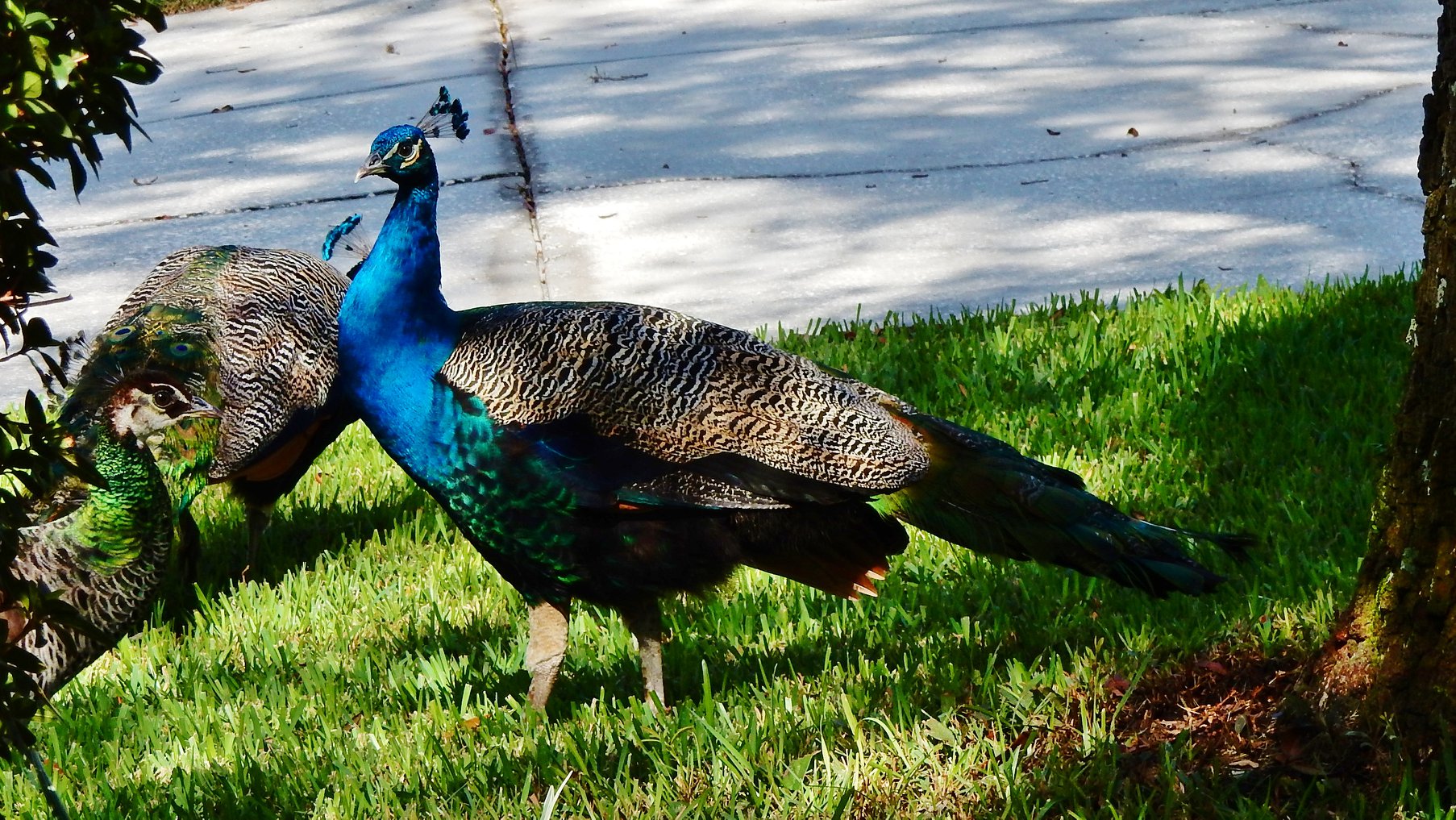Peacocks are not native to this state. However, you can find them throughout Central and South Florida, much to the delight and sometimes disgust of their neighbors. Fanning out their splendid green, purple and gold feathers, they’ve made plenty of allies, those who enjoy their prances through places like Brandon’s Hillside Terrace, Wellswood, King Richards’ mobile home park in Gibsonton, and many other neighborhoods. However, they are not always welcome as residents.
Suburban peacocks in Tampa


Peacocks tend to be early morning screechers, make themselves at home on car hoods, and poop. A lot.
“I’m not sure about the pros and cons, but they are so cute in my community. I love to watch them every time they are close to my home,” said Sy Moya of Riverview.
“I live near Providence and Riverview Drive. We had someone in our neighborhood that would steal peacocks and sell them,” said Autumn Maria Laietta. “Back in the day, we had a neighbor walk around the neighborhood around 5 p.m. They start calling for each other. They sleep on our cars during the day and sleep in trees at night. They’re absolutely beautiful.”
Related: Audubon’s Jay Watch Hits 20th Anniversary
Tasha Crabb has a different view. “We just bought our house here almost two years ago and wasn’t aware they were here. They are definitely obnoxious with their loudness and crapping, scratching up cars and running around on the roof.”
So, who regulates these large, controversial peafowl? Well, there are actually few regulations since most of them are not claimed by anyone as pets. Instead, they are protected by animal cruelty laws, and they roam at will.
Audubon Florida’s Director Julie Wraithmell says she gets few calls about peacocks. And the Florida Fish & Wildlife Conservation Commission says its officers cannot go on private property to cull their flocks or move them.
These jewel-toned peafowls sometimes pit neighbors against each other, as occurred not long ago in Miami neighborhoods. That constant pooping and sometimes extensive property damage enrage some, while others call for their continued protection and consider them a fabulous addition to otherwise ordinary streets.
Kelzy Wilder, of Riverview thinks they need more regulation.
“They need to be treated like dogs. If they’re not on a leash, they need to be on the owner’s property. Otherwise, they should be able to be picked up by animal control.”
The only problem is, they are rarely claimed by individuals.
Still, Wilder says, they wreak havoc on native birds and reptiles by eating the food those Floridians would otherwise consume.
“Peacocks and peahens can be giant nuisances and can chew through electrical wiring, and I’ve had peacocks scratch up my car badly, even chipping window glass because they thought their reflection was a rival,” Wilder says. “Just letting them roam is not a good option.”
The problem with peacocks


Native to Asia and Africa, peafowl are considered a domestic species, just like pigs, cattle, chickens, and sheep. And according to FWC, they fall under the jurisdiction of local governments, most of which do not even try to regulate them.
The major problem with peacocks, some say, is their proliferation. A neighborhood might start out with a couple of beauties but end up with 50. A peahen can lay 15-30 eggs each mating season, which is why some neighborhoods end up with dozens of peacocks prowling both suburban and urban areas.
“The peacocks have been totally out of control for over two years!!” a Pinecrest resident wrote to Miami officials in an email, according to the Washington Post. “They have inundated my daughter’s neighborhood with their poop all over the place. Their wailing early morning and evening is a constant distraction and annoyance.”
Some Brandon residents got so fed up with the peafowl in 2020, they contacted WFLA’s Better Call Behnken. One woman called the birds a health hazard, especially during mating season, when they are so visible and she has to navigate that poop.
A Miami city commissioner said that while many adore them, they are one of the city’s most controversial issues, if one can imagine that. The emails sometimes pour in.
Related: Brown Pelican Entanglements a Worrying Issue
One Brandon woman told WFLA’s Shannon Behnken that she must wear earplugs to sleep at night—tuning out the peacock shrieking that can go on for hours.
Others said they get so loud that they are ready to sell their houses, fed up with the midnight chorus.
Mostly, however, people tend to just carry on, some feeding and photographing the birds, others stuffing in their earplugs and fussing under their breath.






























